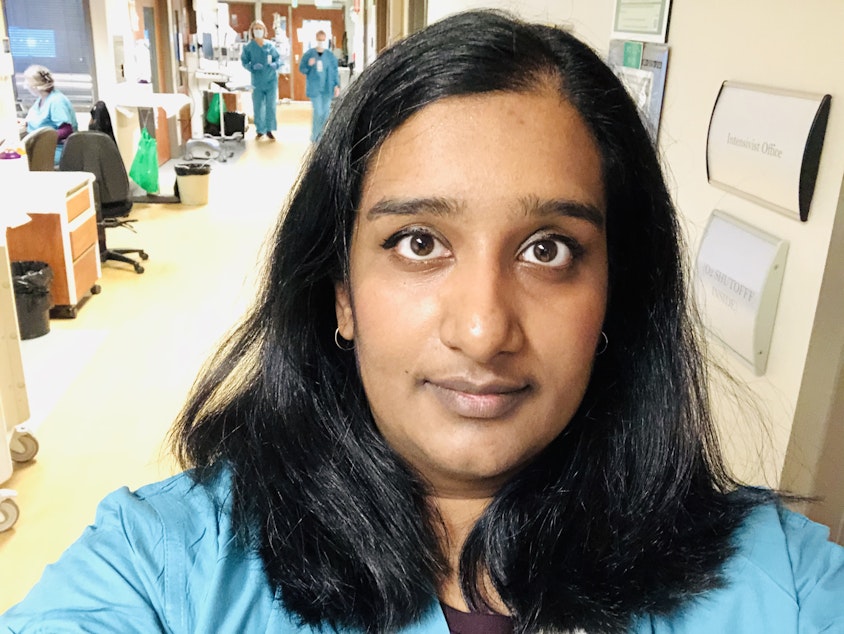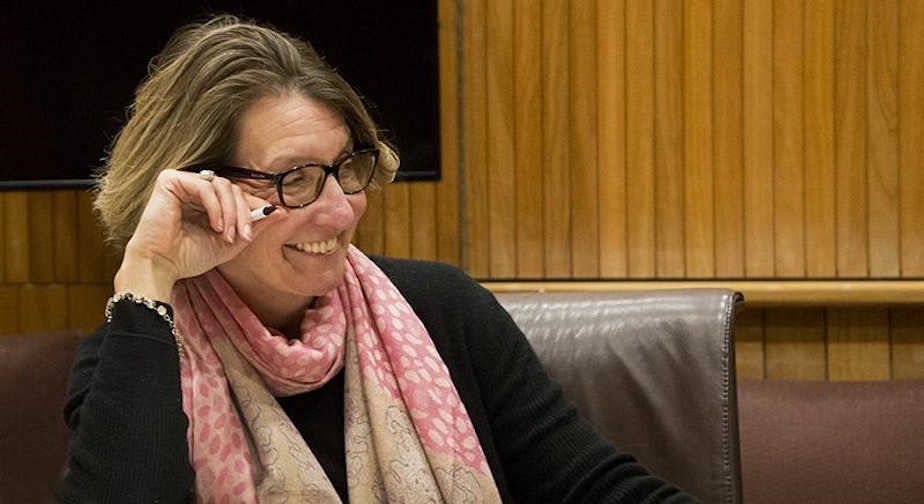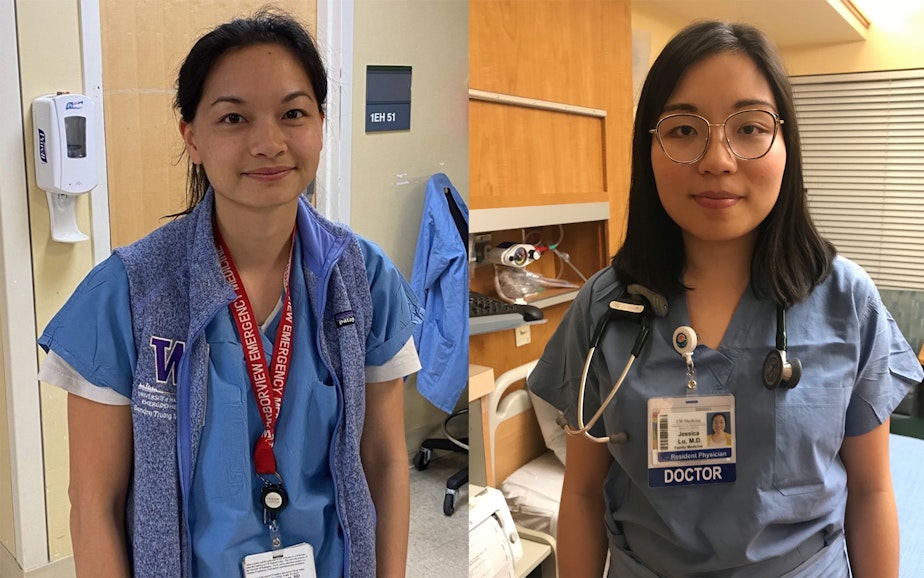Who will heal the healers when coronavirus is over?

Preethi Balakrishnan is a doctor at Swedish Hospital and you might say she has a lot going on right now.
She works the night shift—from 7 p.m. to 7 a.m.— rotating through six Swedish intensive care units, where most of her patients are very sick with Covid-19.
"It's tough. I think everyone has their personal way of dealing with it,” she said.
When caring for Covid-19 patients, Balakrishnan and other healthcare workers must be suited up in protective gear. The patients are not allowed to have visitors in their rooms. No friends, no family.
She considers that the hardest part of her job—having to tell family members that they can’t see their loved ones.
“If it was one of mine, right, whoever, my mom, my husband, my child, you would have to keep me down with restraints to be not there with them,” she said. “I think it's really hard to be that person that says, continually says, you can’t come.”
At the end of her 12-hour shift, Dr. Balakrishnan goes home to her husband and her two young children, ages 1 and 2 ½ years old. She has a routine to make sure she doesn’t bring the virus with her. She changes all her clothes, wipes down her exposed skin, and when she arrives home, she showers. Still, she worries about her family.
Sponsored
“I don't know that I could tell you there's a scientific basis to that fear because I'm doing all the right things," she said. "But just knowingly being in the trenches, and then coming home and being that conduit between them and the rest of the world for exposure. Yeah, it's a lot of guilt."
Covid-19 has been a strain for everyone, but healthcare workers are dealing with an unusually large number of stressors. They are confronting an unknown disease, dealing with constantly changing protocols, caring for sick and dying patients, all while worrying about themselves, their friends, family, and colleagues.
"This ongoing stress is really kind of a beast that we have to battle," said Dr. Paul Schoenfeld, a clinical psychologist who works at The Polyclinic.
Schoenfeld is on a team that provides counseling to healthcare workers at The Polyclinic. He said the sustained stress that many are living through often manifests in complaints of increasing fatigue and difficulty concentrating.
At UW School of Medicine, Dr. Patricia Kritek, a critical care doctor and associate dean for faculty affairs, sees that and more.
Sponsored
“I’d say anxiety and grief are probably the two biggest emotions that we hear about talking with folks,” she said.
"We are already a stressed community”
We might think of doctors, nurses and other front-line healthcare staff as being resilient. After all, they choose to be in a professional where you experience people’s pain and suffering daily.
But even in normal times, healthcare workers report high levels of burnout. The suicide rate for physicians is double the national average.
Dr. Sandeep Sachdeva, a palliative care specialist who is also chief medical officer of Swedish Edmonds and Swedish Mill Creek, describes provider burnout as a “silent epidemic.”
Sponsored
“We are already a stressed community,” he said. “There’s the constant trauma of the fact that you’re dealing with individuals who are having probably the worst day of their lives, and you’re soaking in their trauma day in and day out. So there’s the concept of having these mini-doses of trauma accumulating over time.”

At the same time, healthcare workers are often taught to downplay their own emotions lest they interfere with their work performance.
“They’re not really taught that it’s okay to have emotions, that it’s okay to express your emotions,” said the Polyclinic’s Dr. Schoenfeld. “A lot of physicians keep their feelings inside and then they end up struggling with depression themselves.”
Dr. Schoenfeld said it’s appropriate to keep an emotional distance from patients so you can think clearly and respond appropriately, but at the same time, “We’re human beings, and we have feelings, and we have emotions, and we have to acknowledge them.”
Sponsored
What’s being done?
Many hospitals have long-standing wellness programs to address the problem of burnout, and they are stepping up those offerings in response to Covid-19. The UW School of Medicine has a Covid-19 support website with a long list of tools meant to decrease stress, including relaxation training, yoga classes, and mindfulness exercises.
The UW just set up its own peer support network where trained staff meet with their peers for one-on-one sessions. Swedish Hospital has twice-weekly peer support groups which are led by mental health professionals. Families are also invited to join.
Since fear of the unknown can feed anxiety, hospitals are stepping up staff debriefings, email and web updates, and some are holding Zoom town hall meetings.
“The big thing that is unique in our current situation is the need to reduce uncertainty where possible," said Dr. John Nelson, a hospitalist physician and co-chair of the Provider Support Committee at Overlake Medical Center in Bellevue. "It’s really, really important to communicate very effectively to remove doubt and uncertainty wherever you can.”
Sponsored
Hospitals are also working to increase the availability of mental health care for those who need additional support, in many cases offering access to free virtual visits to mental health care providers from their own institutions.
At the UW’s Psychiatry Department, Mollie Forrester, a clinical social worker and administrator, sent out an email asking for faculty and staff to volunteer.
“I think within two days we had 50 people from our immediate department reaching out," she said.
Mental health providers from other departments have also stepped forward, as have dozens of providers from the community.
“To see what is possible is remarkable. I have been heartened to see what people are able to do,” Forrester said.
But even as hospitals are working to provide these services, not all are being used. For the first few weeks of the crisis, Overlake had mental health counselors available to meet with healthcare providers on site.
According to Dr. John Nelson, they eventually suspended that program because not enough people were seeking them out.
Taking care of themselves
Many healthcare workers say they haven’t had the time or the energy to take advantage of the mental health and wellness programs their employers are offering. Or they find their support elsewhere.
Dr. Jessica Lu is a second-year resident in family medicine at UW. In March, one of her regular patients, an elderly woman who lived in a nursing home, was admitted to the emergency room and tested positive for Covid-19. Dr. Lu found out her patient had died when a notification on her phone announced that her status had changed from “alive” to “deceased.”
“When it is one of your patients, you weren’t there at the bedside, you knew them when they were well, it’s a hard-to-describe feeling of loss,” she said.
One thing that helps is writing.
"It helps me process my feelings and creates a document of my exact emotions at the time that I can look back upon," she said.
She and her colleague Dr. Sandra Truong also started an Instagram page to help connect with other healthcare providers going through similar experiences.
For Dr. Truong, who is an emergency medicine resident at UW, the hardest part about her job is feeling separated from her patients. The personal protective gear that she wears feels like a barrier, and you are not allowed to touch patients or put a hand on them to reassure them.
“Patients are sick and scared, they are in a vulnerable place," she said. "One of the most difficult aspects has been to feel distance from my patients, we are behind masks, we can’t clearly communicate what is happening to them."
Dr. Truong said she typically relies on support from her colleagues, but being socially distant from them has been hard as well. But she said she takes care of herself by spending time with her spouse, cooking, picking up hobbies, and exercising.

What the future holds
There is uncertainty about what the long-term effects of this pandemic will be on the mental health of healthcare workers. A study of Chinese healthcare providers found about half of them suffered from depression and nearly half from anxiety.
During previous pandemics, like SARS and Ebola, mental health issues among healthcare providers continued to arise after the initial emergencies were over.
"For sure, we're going to have issues as we try to come back towards something that's a new normal. And I feel like we're going to need to reinvest in taking care of folks as we do so,” said the UW’s Dr. Patricia Kritek.
That makes sense to Dr. Preethi Balakrishnan, the Swedish critical care doctor. Right now, she sees her own therapist, and her husband is a clinical psychologist, which also helps.
"We truly may not know the effect it is having, at least emotionally, until we get much further away from it," she said. "It's hard to really quantify that right now. Because a lot of the times you just have to set it aside and keep doing it, you know?”
Mental health providers say that it’s important to remember that even with all the distress that people are feeling right now, most will come out of this okay.
Some may be diagnosed with post-traumatic stress, or other psychiatric disorders, but that would likely be a small minority of people. Psychologists say that in times of national emergency, people also experience something called post-traumatic growth. That’s when they find strength and resilience that they didn’t know they had.
Dr. Chris DeCou is a clinical psychologist who works at the UW’s Harborview Medical Center. He said that even though Covid-19 has been an immense tragedy, it has brought people together.
“We are all connected in ways we had never even thought of, and to such a degree that leaving our homes could put other people at risk,” he said. “Many of us have become keenly aware of how much other people matter. And the unintended consequences of that could be growth and transformation that are in fact positive.”
Resources:
UW Medicine: "Acknowledging the challenges: UW medicine Covid-19 support
American Medical Association: "Caring for our caregivers during Covid-19"
Mt. Sinai Health System: "Well-being staff resources during Covid-19"
From Swedish physician Dr. Tanmeet Sethi, "Gratitude Roadmap," a daily gratitude practice




